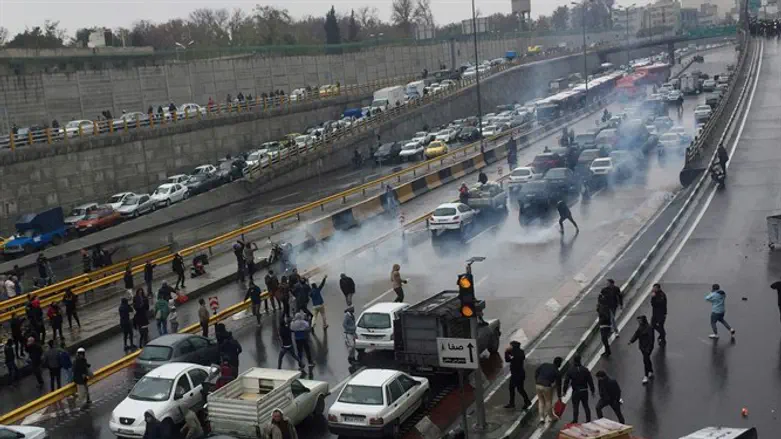
One civilian was killed and other people injured in Iran's Sirjan following protests in the central city over a petrol price hike, AFP reported Saturday.
Reports said that at least 15 people were killed in demonstrations across the country against the government move.
"Unfortunately someone was killed," Sirjan's acting governor Mohammad Mahmoudabadi said, adding that the cause of the death and whether "the individual was shot or not" was still unclear.
Other people were injured during the demonstrations, he said.
Mahmoudabadi stressed that "security forces did not have permission to shoot and were only allowed to fire warning shots... which they did."
He said it was a "calm gathering" that was exploited by some who "destroyed public property, damaged fuel stations and also wanted to access the oil company's main fuel depots and set fire to them".
Their effort was thwarted by forces including the police, the Revolutionary Guards and the Basij militia, Iran’s ISNA news agency quoted him as saying.
Iranian Interior Minister Abdolreza Rahmani Fazli told state TV on Saturday that security forces will act to restore calm if the protesters “damaged public properties”.
“Security forces have so far shown restraint and have tolerated the protests. But as the calm and security of people is our priority, they will fulfill their duty to restore calm if attacks on public and individuals’ properties continue,” the minister was quoted as having said.
The protests came after Iran imposed petrol rationing and raised pump prices by at least 50 percent on Friday, saying the move was aimed at helping citizens in need with cash handouts.
The measure was expected to bring in 300 trillion rials ($2.55 billion) per annum, the head of the country's Planning and Budget Organization, Mohammad Bagher Nobakht, said on state television.
About 60 million Iranians in need would get payments ranging from 550,000 rials ($4.68) for couples to slightly more than two million rials ($17.46) for families with five members or more, he added.
Under the scheme, drivers with fuel cards will pay 15,000 rials (13 US cents) a liter for the first 60 liters of petrol bought each month, with each additional liter costing them 30,000 rials.
Iran's economy has been battered since May last year when US President Donald Trump withdrew the United States from a 2015 nuclear agreement and reimposed crippling sanctions.
The rial has plummeted in value against the US dollar, inflation is now running at more than 40 percent and the International Monetary Fund projects that the troubled economy will contract by nine percent this year and stagnate in 2020.
In response to the US withdrawal from the nuclear deal and its imposition of sanctions, Iran has gradually scaled back its compliance with the 2015 deal.
Its latest move came earlier this month when it resumed uranium enrichment at its underground Fordow nuclear facility.
Iranian President Hassan Rouhani said on Saturday that currently "75 percent of the country are under pressure" and the extra revenue will only go to them, not the treasury.
Rouhani had tried to hike fuel prices in December but was blocked by parliament in the wake of protests that rocked Iran for days.
The speaker at the time ruled out the move as unpopular and said it was "not in the interests of the country".
Iran has suffered from anti-government protests several times in recent years. In July of 2018, several people were injured in the southwestern Iranian city of Khorramshahr during a demonstration against water pollution, according to Iranian state media.
Iran also suffered from anti-government protests in January of that year. Iranian Supreme Leader Ayatollah Ali Khamenei claimed at the time that "Iran's enemies have been encouraging the demonstrations in the country in recent days with money, weapons and intelligence agents."
Similarly, Iran’s former president Mohammad Khatami, who is viewed as a “reformist” and a “moderate”, accused the United States of stirring unrest in the country.